How Long Do New Construction Homes Last—and How Long Do They Take to Build?

If you’re planning to purchase a new construction home, two of the most common questions you may have are:
How long will it take to build my new home?
How long will my new home last once it’s built?
While every home is different, most new construction projects follow a similar process.
In this blog, we’ll walk you through typical timelines, key milestones during construction, and how long different components of a newly built home are expected to last.
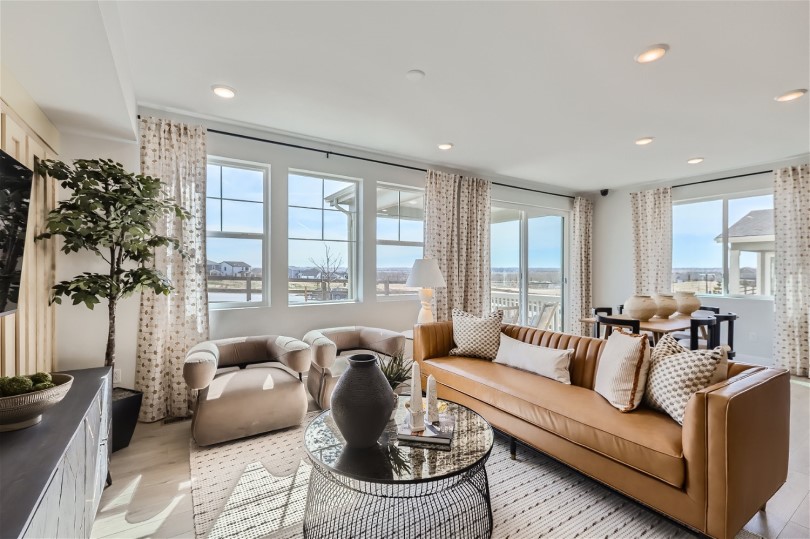
Artisan One Floor Plan, Artisan Portfolio, Barefoot Community, Firestone, Colorado
How Long Does It Take to Build a New Construction Home?
In the U.S., it takes on average about 6.5 to 7.2 months to build a new single-family home once permits are issued. In Canada, building timelines tend to be similar.
What Factors Affect the Building Timeline?
Every home is unique, and so is the timeline to complete it. While most new construction builds follow a general process, a few key factors can influence how long it takes to complete. In both the U.S. and Canada, common variables include:
Home Size and Customization
Large and complex home designs with extensive built-in features typically take longer to complete compared to smaller, simpler homes. Your builder will take these extras into account when determining the approximate time it will take for your new home to be built.
Permitting Requirements
Securing building permits is one of the first steps in the process and can take anywhere from a few weeks to a few months, depending on local regulations and the scope of the build. In some cases, permits may already be in place, allowing construction to begin sooner.
Weather and Seasonal Conditions
Construction typically continues year-round, but weather can affect the pace of progress, particularly during colder months or in regions with heavy rain or snow. For example, in the U.S., homes built in the Northeast often take closer to 11 months, while those in the South average around 6 months. Similarly, in Alberta, winter conditions may extend timelines to around 10 months, while summer builds can be completed closer to 6 months.
Homesite Preparation
Before construction begins, the land needs to be cleared and prepared. This process includes removing trees or rocks, grading the lot, and addressing any drainage needs. The extent of this prep work—and whether any unforeseen site issues arise—can affect the overall timeline.
Labor and Material Availability
During periods of high demand, it’s not uncommon to see longer lead times for both skilled trades and building materials. Factors like supply chain disruptions and regional labor shortages can occasionally introduce delays, though many builders plan proactively to stay on schedule.
Design Changes or Late Selections
Most builders provide timelines for homebuyers to finalize design selections, helping ensure that materials are ordered and delivered on time. Changes made late in the process can affect the schedule, especially for items with long lead times. For example, cabinets may take 6–8 weeks to arrive and 1–2 weeks to install, meaning a late change could impact your move-in date by several weeks or more.
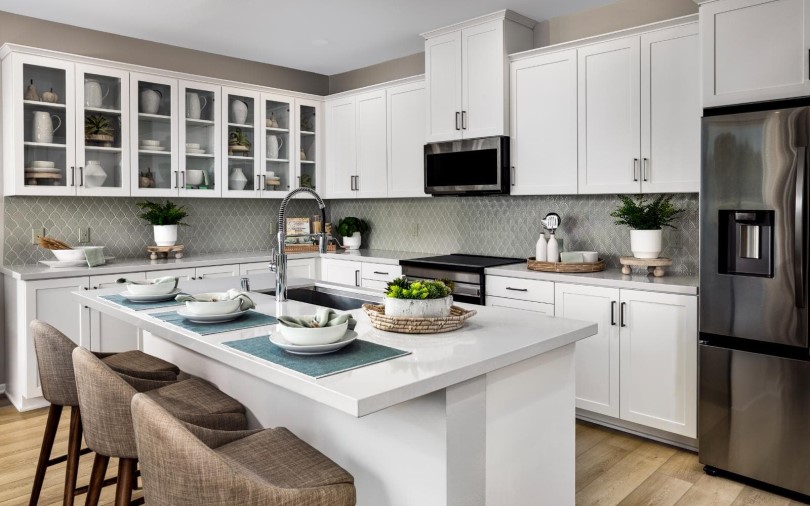
Residence 3 Floor Plan, Bloom Collection, Edenglen Community, Ontario, California
The Typical New Home Construction Process
Although timelines may vary based on location, builder, and customization, most new construction homes follow a similar series of steps. Here’s a more detailed look at what typically happens in each phase of building a new home:
Phase One: Permits
Before any construction begins, plans for the home are developed, finalized, and submitted to the municipal building permit office for review. Permits may be required for all or some of the following work: building, electrical, plumbing, and sewer connection.
Depending on your area, many builders have completed the permit process before releasing a home for sale, meaning construction can start right away on your home.
Phase Two: Foundation
With the homesite prepared, the next step is laying the groundwork—literally. The house is carefully staked out, excavation begins, and the footings are formed and poured to provide a stable base for the structure. During this phase, utility connections—such as water, electricity, telephone, and cable—may also be installed.
Although the interior of your home is still weeks away from taking shape, this is often when builders ask you to begin making design selections. Choosing materials like flooring, tile, cabinetry, and countertops early ensures they can be ordered in time and helps avoid delays down the road.
Phase Three: Framing
Framing is when your home truly starts to take shape. This phase includes building the structure’s skeleton—interior and exterior walls, floors, and the roof are all assembled.
Once the house is fully framed, windows and exterior doors are installed to help “dry in” the home and protect it from the elements, which allows interior work to proceed regardless of the weather.
Phase Four: Mechanical Systems
With the structure in place, the next step involves installing the home’s core systems:
- Electrical wiring
- Plumbing
- HVAC (heating, ventilation, and air conditioning)
This phase also includes running ductwork, setting up water and gas lines, and preparing for appliance and lighting installation. These mechanicals are inspected before insulation and drywall go up.
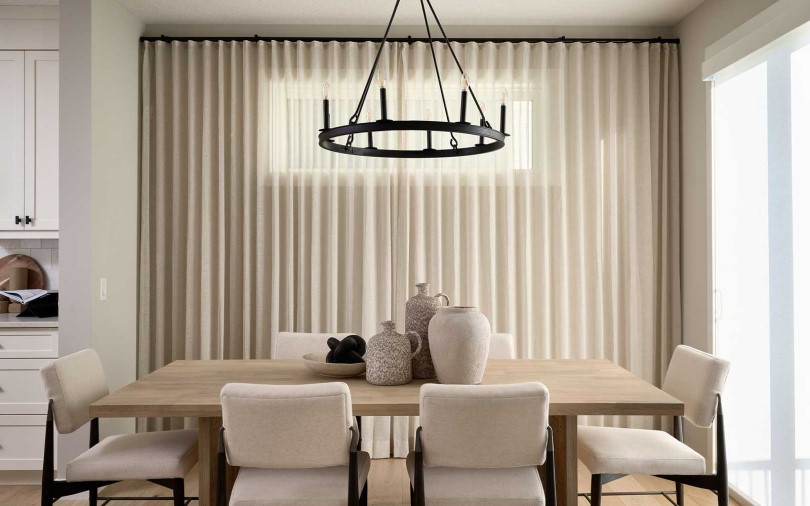
Purcell 26 Floor Plan, Front Garage Conventional Collection, Livingston Community, Calgary, Alberta
Phase Five: Insulation & Drywall
After mechanical inspections are complete, insulation is added to walls, ceilings, and floors based on local building codes and energy efficiency goals. Then, drywall is hung, taped, and textured. At this phase, your home starts to feel more complete, with clearly defined rooms and living spaces.
Phase Six: Interior Finishes
This phase is often the most exciting part for homebuyers, as design choices begin to come to life. Interior finishes are typically installed in the following order:
- Paint
- Cabinetry
- Countertops
- Flooring
- Tilework
- Plumbing and lighting fixtures
- Interior doors and trim
This phase may also include the installation of smart home features or energy-efficient systems if they were part of the build package.
Phase Seven: Final Inspections & Walk-Throughs
Before possession, your home goes through a final inspection process to ensure it meets building codes and quality standards. You’ll be invited to complete a walk-through to review your home, identify any items that may need adjustment, and learn how to operate features like thermostats, HVAC, and any included smart home technology.
Phase Eight: Possession Day
On possession day, you’ll do one last walk-through to confirm all noted items have been addressed. Once everything checks out, the home is yours, and you can begin moving in.
Worth Noting: Some builders offer regular construction updates or homeowner orientations throughout the process, so you can stay informed and feel confident as your home progresses toward completion.
If you’re hoping to move in quickly, consider a quick-possession or move-in-ready home, which may already be under construction or completed.
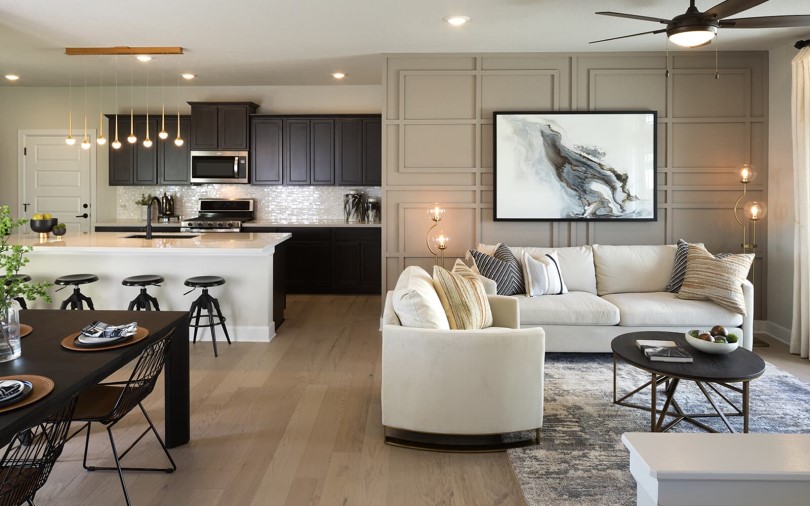
Heritage Floor Plan, Urban Courtyard Homes Collection, Easton Park Community, Austin, Texas
How Long Will a New Construction Home Last?
A newly built home—when constructed properly and maintained over time—can last for decades or even a century. The longevity of different parts of the house depends on materials, climate, and care.
Foundation Material
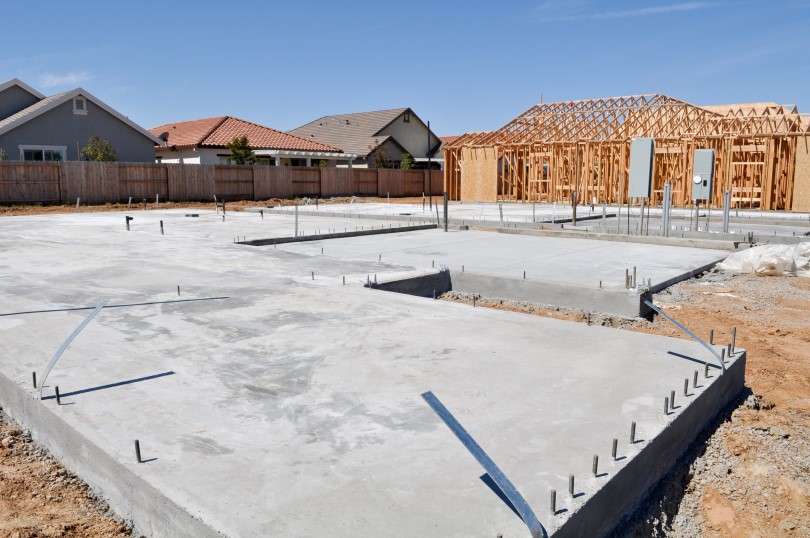
The foundation is the backbone of any home, providing stability and support. The type of foundation your home has will play a role in its longevity, as some are more durable than others:
Concrete
The vast majority of foundations today are designed with concrete and poured-block footings. Concrete is a popular choice because it is durable and can last over 100 years. This type of foundation is also waterproof for about the first decade.
Wood
Wood foundations made out of pressure-treated lumber are another option. While they’re less common than concrete, they provide durable support for homes when they’re properly constructed and maintained. Proper ventilation, moisture control, and regular inspections ensure your wood foundation lasts 60 years or more.
Brick
Brick foundations are known for their durability and longevity. Their resistance to moisture, insects, and fire makes them an excellent choice for a long-lasting foundation. Proper maintenance becomes even more crucial in regions with harsh climates, where freeze-thaw cycles can cause damage. Quickly addressing any issues can help your brick foundation last 65 years or longer.
Structural Components
Several generally durable structural components make up your home:
Roof
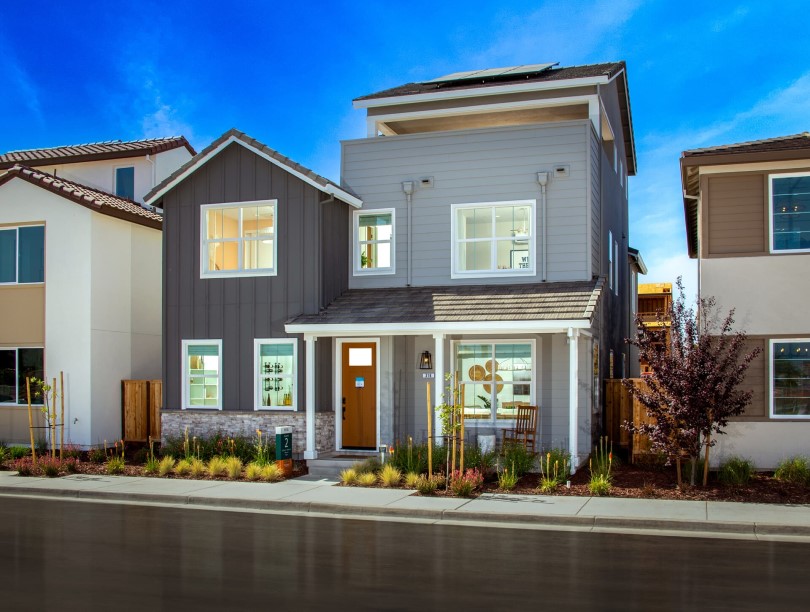
Residence 2 Floor Plan, Patina Neighborhood, Napa RiverSound Community, Napa, California
The longevity of your roof depends on the type of material used:
- Asphalt Shingles: The most popular roofing material choice, with a lifespan of around 20 to 30 years. High-quality, architectural-grade shingles can last longer, up to 50 years.
- Metal Roofing: Metal roofs, such as steel, aluminum, and copper, can last 40 to 70 years or more with proper maintenance.
- Wood Shingles/Shakes: Wood roofing materials can last 30 to 40 years, depending on the type of wood, local climate, and preventative maintenance for rot and decay.
- Tile Roofing: Clay and concrete tiles have a 50 to 100-year lifespan as they are exceptionally resistant to harsh weather conditions.
- Slate Roofing: Slate roofs are among the longest-lasting, with a life expectancy of 75 to 100 years. Proper installation and maintenance are a must to ensure this longevity.
- Composite Roofing: Composite or synthetic roofing materials offer a middle-ground option, typically lasting around 30 to 50 years, depending on the product’s quality.
Drywall
Drywall is a common building material used for interior walls and ceilings. Its longevity depends on the quality of installation, environmental conditions, and maintenance, with the average lifespan ranging from 30 to 70 years.
Windows
Unless an accident or weather damages your windows, well-maintained ones can last 15-30 years or longer. Broken seals can be common, so addressing that kind of minor issue an help extend the life of your windows.
Flooring
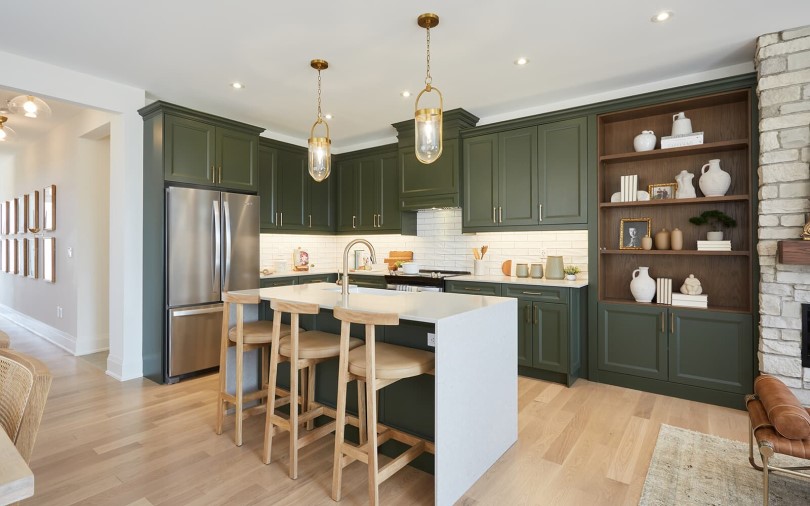
Denmar Floor Plan, Traditional Collection, New Seaton Community, Pickering, Ontario
Flooring covers a significant amount of square footage and sets the tone of your entire home. Common flooring materials offer a different range of lifespans:
- Hardwood: High-quality hardwood floors can last generations, often exceeding 50 years or more with proper care.
- Laminate: Laminate is a more cost-effective alternative to real hardwood, with a lifespan of 15 to 25 years.
- Tile: Ceramic and porcelain tile floors can last decades or even longer. They’re incredibly durable and waterproof, and individual tiles can be replaced should damage occur.
- Luxury Vinyl: Luxury vinyl is easy to clean, scratch- and fade-resistant, and waterproof. Luxury vinyl has an average lifespan of 10 to 20 years.
- Carpet: Carpet lifespan can vary greatly, typically lasting 5 to 15 years. Regular cleaning and maintenance can help extend its life, but replacement is often required sooner in high-traffic areas.
Siding and Stucco
Siding and stucco are vital exterior finishes that protect your home and enhance its curb appeal.
- Vinyl Siding: Vinyl siding typically lasts 20 to 40 years or more.
- Wood Siding: Wood siding, like cedar or redwood, can last 20 to 50 years, but regular maintenance is essential to prevent rot and decay.
- Fiber Cement Siding: Fiber cement siding has a lifespan of 25 to 50 years or more. It’s known for its durability and resistance to rot, pests, and weather.
- Stucco: Stucco exteriors can last for several decades to over a century with proper care.
Internal Fixtures
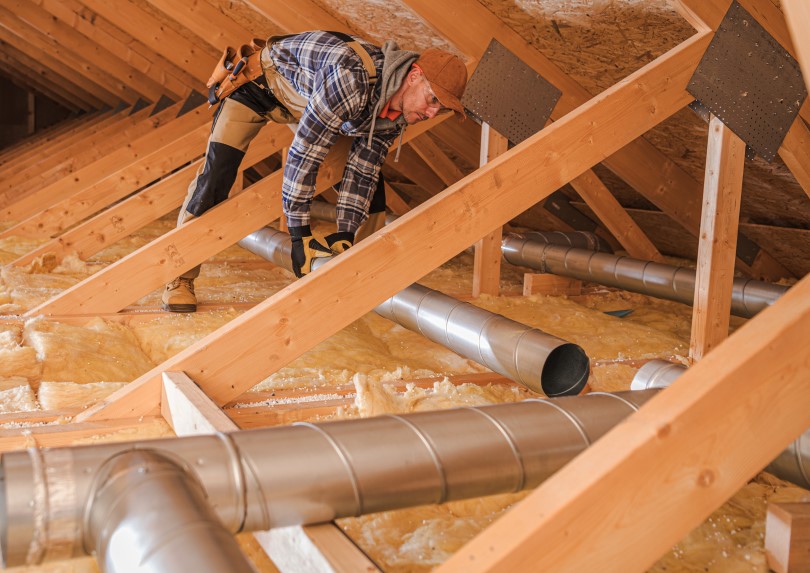
Your home’s internal systems, such as plumbing, electrical, and HVAC, are essential for daily comfort and functionality. Routine maintenance of these items is just as important, if not more, than the exterior. Significant areas include:
Insulation
Most home insulation types are designed to be long-lasting and not much of a maintenance concern. Inspect and replace your insulation if you notice a change in your energy bills.
- Fiberglass: Fiberglass insulation can last several decades, often exceeding 50 years, when undisturbed and properly installed.
- Cellulose: Cellulose insulation typically lasts 20 to 30 years or more. Ensuring it remains dry can help prolong its effectiveness.
- Spray Foam: High-quality spray foam can last 80 years or more when installed correctly, as it forms an airtight seal and is highly durable.
- Mineral Wool (Rock Wool): Mineral wool can last 100 years with correct installation.
HVAC System
Proactive maintenance of your HVAC system can improve its longevity. Changing the air filters regularly and performing tune-up service can prevent damage and save money in the long run. On average, your furnace should last 15-20 years, and your air conditioner 10-15 years.
Plumbing
Plumbing pipes are essential for your home’s water supply and drainage. Their lifespan will vary based on the material and usage:
- Copper Pipes: Copper pipes are highly durable and can last 50-70 years or more. They are resistant to corrosion and offer excellent water flow.
- PEX (Cross-linked Polyethylene) Pipes: PEX pipes have gained popularity for their flexibility and resistance to freeze damage. They can last up to 50 years or more as they are less likely to crack or break.
- Galvanized Steel: Galvanized pipes have a shorter lifespan of around 20 to 50 years as they can rust over time.
- Cast Iron: Primarily used for drainage, cast iron pipes can last 50 to 100 years if maintained properly.
Electrical
Properly installed wiring can last 70-80 years or more, but electrical components like outlets and switches may need replacement sooner. Older homes may have outdated wiring that requires upgrading for safety and efficiency.
Electrical panels typically last 25 to 40 years. Upgrading to a modern panel with circuit breakers is often necessary to accommodate increased electrical demands and ensure safety.
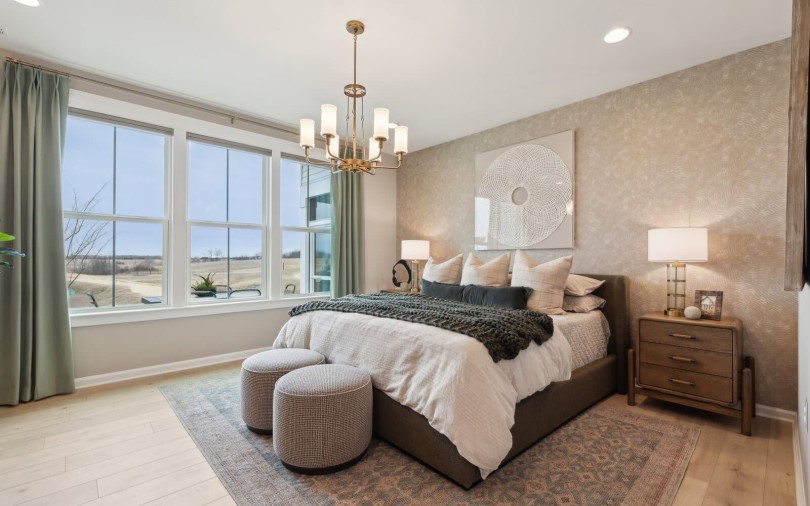
How to Increase the Lifespan of Your Home
A new home is a major investment, and you want to ensure it can stand the test of time. Here are five ways to prolong your home’s longevity:
Choose durable materials
When choosing materials for your new construction home, select the ones that will last the longest for how your household lives. Laminate or luxury vinyl may suit your lifestyle better than real hardwood or carpet if you have pets or kids. A marble-look quartz countertop may be more forgiving than natural marble. Learn the pros and cons of popular materials and make informed choices to fit your needs best.
Schedule routine maintenance
Routine repair and maintenance can improve the longevity of a home. Stay on top of tasks and keep your to-dos in order with our Spring Cleaning Checklist. From everyday tasks to nitty-gritty appliance cleanouts, we cover the steps to maintain your home all year round.
Address issues quickly
If you discover an issue or have ignored a minor problem, now is the time to address it. Don’t wait for it to become a significant or costly repair. Being proactive can save you hundreds, if not thousands, of dollars.
Know your climate
Your area’s climate will play a part in your home’s longevity. If you live in an area with harsh temperatures, familiarize yourself with the proper steps to ready your home as the seasons change. You can explore our blog on How to Winterize Your Home for some tips to prepare your home for the winter weather ahead.
Keep it clean
Maintaining a clean and tidy home goes beyond aesthetics; it plays a significant role in your home’s longevity. Regular cleaning prevents the buildup of dirt, dust, moisture, and pests, contributing to wear and deterioration. You also reduce the risk of mold, rot, and structural damage, which can affect materials like wood, drywall, and insulation. Clean and well-maintained appliances, HVAC systems, and plumbing fixtures tend to function more efficiently and last longer.
The Brookfield Residential Difference
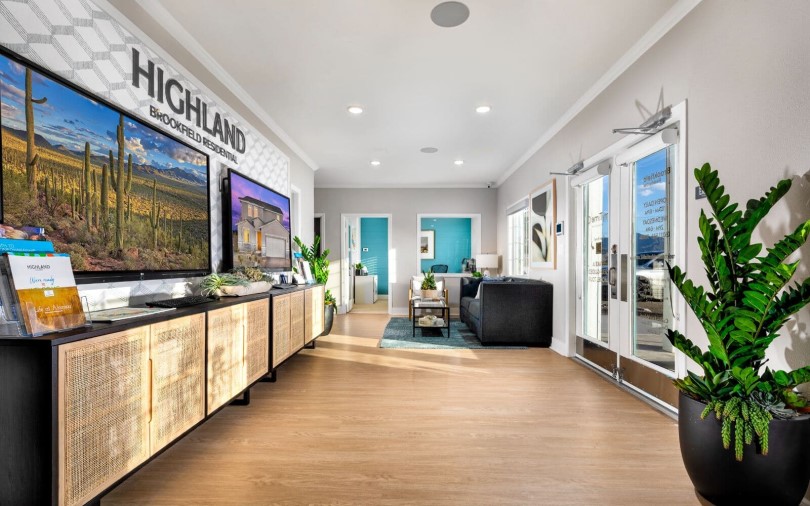
Alamar Community, Avondale, Arizona
For more than 65 years, Brookfield Residential has been creating the best places to call home. Our homes, just like our communities, are built to add value and enrich the quality of life for our homebuyers. Learn more about us and check out our customer reviews for real homeowner testimonials!
You can explore where we build and connect with our sales team when you’re ready to learn more. We’ll be expecting you!
The information provided in this blog post is for informational purposes only and should not be considered investment, professional, or legal advice. Please consult a professional before making real estate decisions. Brookfield Residential is not responsible for any actions taken based on the information provided.
